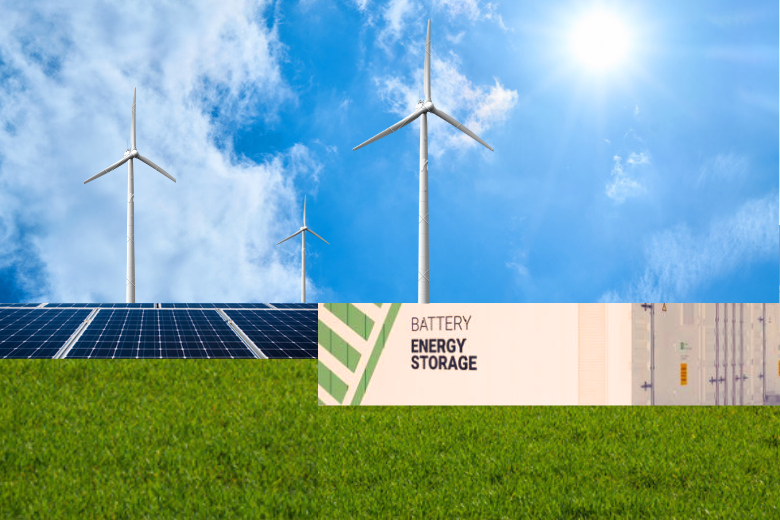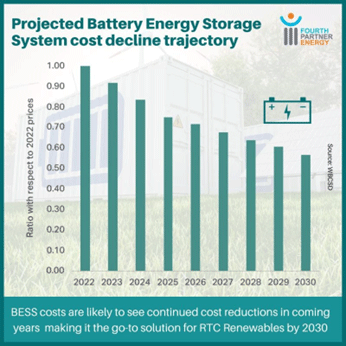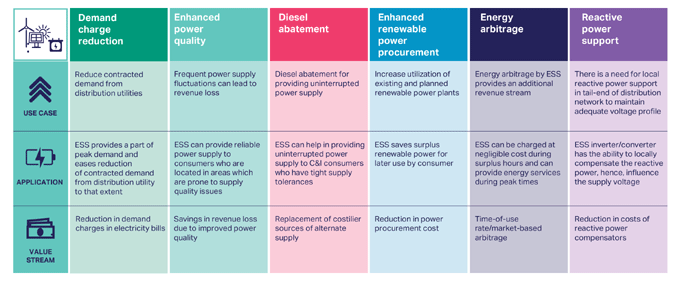Battery Energy Storage Systems: The Key to a Stable, Round-The-Clock, Renewable Energy Powered Future
4PEL Staff
November 2023

What Are Battery Energy Storage Systems?
Battery Energy Storage Systems (BESS) is an advanced tech solution that enables storage of power from various sources for use at a later point in time. There are multiple types of batteries available in the market today, the most popular of which is Lithium-Ion owing to its high efficiency and cost-effectiveness.
Flow of electricity is not always constant, with fluctuations due to change in weather, black-outs and even geo-political reasons. To combat this, BESS has become an imperative to ensure grid stability and provide uniform back-up power to businesses and homes.
Today, BESS has become critical in decarbonizing the energy system and reducing GHG emissions. It is being deployed globally to build stable, resilient energy grid infrastructure that is also capable of handling the intermittent nature of renewable energy.
Building a Case for Battery Energy Storage Systems (BESS)
According to the International Energy Agency (IEA), Renewable Energy is set to become the largest source of global electricity generation by 2025 – to enable this, it also becomes important for the grid infrastructure, especially in developing countries to become smart and more flexible to accommodate the dynamic or intermittent nature of RE power.
India is the 3rd largest power consumer in the world, with an ambitious Net-Zero emissions target of 2070 – which means improving grid stability, flexibility and upgrading infrastructure become top priority. Battery Energy Storage Systems can help address this challenge in the most eco-friendly manner. According to CEA estimates, India will need nearly 52 GW/260 GWh of BESS by 2032 with costs significantly lowering by the end of the decade. Furthermore, the government’s push towards BESS with policy measures like energy storage obligations for Discoms and C&I consumers will be a key driver.
According to industry research, BESS costs are inching lower every year and is the ideal solution to meet over 50% of the global power system's flexibility needs by 2050 – as it helps balance out supply variability while enabling greater consumption of self-generated renewable power by consumers. It also reduces the need to feed excess electricity back to the grid.

Role of BESS in Corporate India’s Energy Transition Story
India’s businesses are leading the charge in global energy transition, with a lot of companies setting stringent RE100 and Net Zero targets.
According to a report by WBCSD (World Business Council for Sustainable Development) – FMCG Major ITC is targeting Net Zero by the end of this decade. While Mahindra, Infosys and Wipro are eyeing 2040, players like ACC, Vedanta, Tata Steel, Ambuja Cement and Aditya Birla have set zero emissions timelines of 2050.
Since these targets are well ahead of India’s 2070 goals, it is evident that businesses will need to migrate to low-carbon sources of electricity in the immediate-term. This also means companies will increasingly opt for round-the-clock renewables, especially since both RE and battery storage costs are declining consistently.
Benefits of Energy Storage for Commercial & Industrial Consumers
- BESS is an excellent alternative to high-cost, polluting Diesel Generators
- Ideal for peak-load management: Efficiently stores excess electricity during off-peak hours and instantly deploys it during peak hours, thereby reducing strain on the grid
- Businesses can save on costly ‘Peak Demand’ charges levied by Discoms
- Helps accelerate Sustainability goals of businesses as BESS helps enables increased consumption of Renewables, providing access to Round-the-Clock clean power
- Costs of BESS has shrunk consistently YoY and is likely to become commercially viable in India over the next year
Possible Energy Storage Use Cases for C&I Customers (Source: WBSCD)

Fourth Partner Energy’s BESS Solutions for the Corporate Sector
At FPEL, we offer integrated clean energy solutions to our C&I clients at the lowest total cost of ownership – this includes BESS solutions so that clients can not only maximise their consumption of clean energy but also have access to round-the-clock supply of low-carbon, low-cost electricity.
Some of our clients that have benefitted from Renewables + BESS include Myntra, Metro Cash & Carry, Hyatt and NTPC. To know more about how your business can switch to clean energy and storage solutions, write in to marketing@fourthpartner.co.



